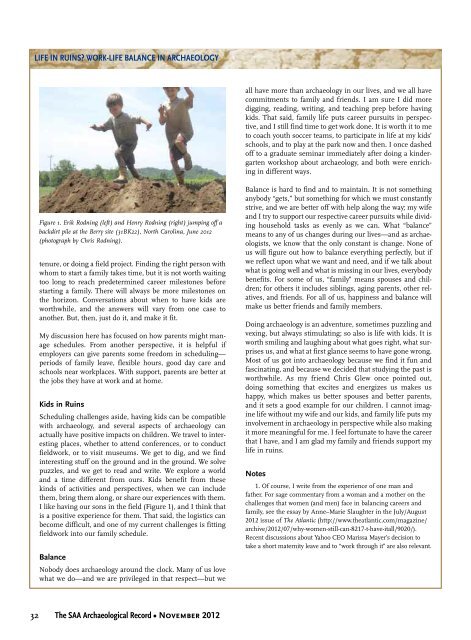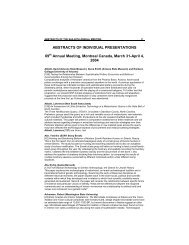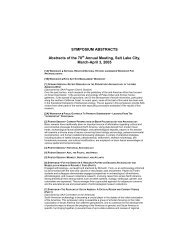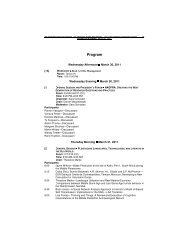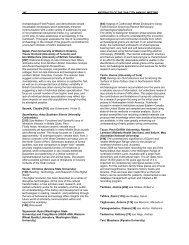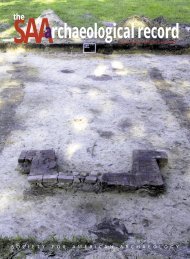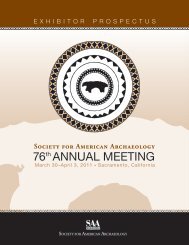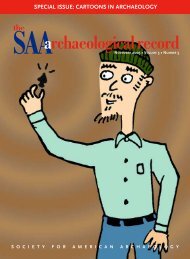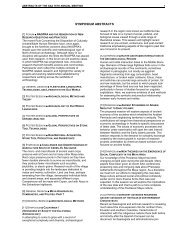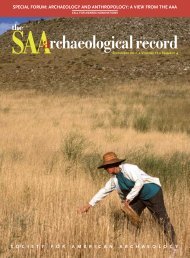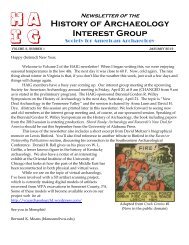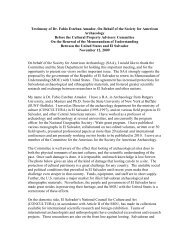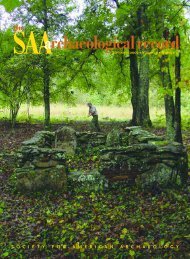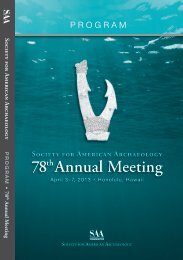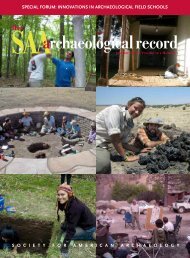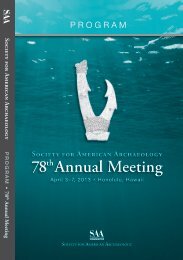The SAA Archaeological Record - Society for American Archaeology
The SAA Archaeological Record - Society for American Archaeology
The SAA Archaeological Record - Society for American Archaeology
You also want an ePaper? Increase the reach of your titles
YUMPU automatically turns print PDFs into web optimized ePapers that Google loves.
LIFE IN RUINS? WORK-LIFE BALANCE IN ARCHAEOLOGYall have more than archaeology in our lives, and we all havecommitments to family and friends. I am sure I did moredigging, reading, writing, and teaching prep be<strong>for</strong>e havingkids. That said, family life puts career pursuits in perspective,and I still find time to get work done. It is worth it to meto coach youth soccer teams, to participate in life at my kids’schools, and to play at the park now and then. I once dashedoff to a graduate seminar immediately after doing a kindergartenworkshop about archaeology, and both were enrichingin different ways.Figure 1. Erik Rodning (left) and Henry Rodning (right) jumping off abackdirt pile at the Berry site (31BK22), North Carolina, June 2012(photograph by Chris Rodning).tenure, or doing a field project. Finding the right person withwhom to start a family takes time, but it is not worth waitingtoo long to reach predetermined career milestones be<strong>for</strong>estarting a family. <strong>The</strong>re will always be more milestones onthe horizon. Conversations about when to have kids areworthwhile, and the answers will vary from one case toanother. But, then, just do it, and make it fit.My discussion here has focused on how parents might manageschedules. From another perspective, it is helpful ifemployers can give parents some freedom in scheduling—periods of family leave, flexible hours, good day care andschools near workplaces. With support, parents are better atthe jobs they have at work and at home.Kids in RuinsScheduling challenges aside, having kids can be compatiblewith archaeology, and several aspects of archaeology canactually have positive impacts on children. We travel to interestingplaces, whether to attend conferences, or to conductfieldwork, or to visit museums. We get to dig, and we findinteresting stuff on the ground and in the ground. We solvepuzzles, and we get to read and write. We explore a worldand a time different from ours. Kids benefit from thesekinds of activities and perspectives, when we can includethem, bring them along, or share our experiences with them.I like having our sons in the field (Figure 1), and I think thatis a positive experience <strong>for</strong> them. That said, the logistics canbecome difficult, and one of my current challenges is fittingfieldwork into our family schedule.BalanceNobody does archaeology around the clock. Many of us lovewhat we do— and we are privileged in that respect— but weBalance is hard to find and to maintain. It is not somethinganybody “gets,” but something <strong>for</strong> which we must constantlystrive, and we are better off with help along the way; my wifeand I try to support our respective career pursuits while dividinghousehold tasks as evenly as we can. What “balance”means to any of us changes during our lives— and as archaeologists,we know that the only constant is change. None ofus will figure out how to balance everything perfectly, but ifwe reflect upon what we want and need, and if we talk aboutwhat is going well and what is missing in our lives, everybodybenefits. For some of us, “family” means spouses and children;<strong>for</strong> others it includes siblings, aging parents, other relatives,and friends. For all of us, happiness and balance willmake us better friends and family members.Doing archaeology is an adventure, sometimes puzzling andvexing, but always stimulating; so also is life with kids. It isworth smiling and laughing about what goes right, what surprisesus, and what at first glance seems to have gone wrong.Most of us got into archaeology because we find it fun andfascinating, and because we decided that studying the past isworthwhile. As my friend Chris Glew once pointed out,doing something that excites and energizes us makes ushappy, which makes us better spouses and better parents,and it sets a good example <strong>for</strong> our children. I cannot imaginelife without my wife and our kids, and family life puts myinvolvement in archaeology in perspective while also makingit more meaningful <strong>for</strong> me. I feel <strong>for</strong>tunate to have the careerthat I have, and I am glad my family and friends support mylife in ruins.Notes1. Of course, I write from the experience of one man andfather. For sage commentary from a woman and a mother on thechallenges that women (and men) face in balancing careers andfamily, see the essay by Anne–Marie Slaughter in the July/August2012 issue of <strong>The</strong> Atlantic (http://www.theatlantic.com/magazine/archive/2012/07/why-women-still-can-8217-t-have-itall/9020/).Recent discussions about Yahoo CEO Marissa Mayer’s decision totake a short maternity leave and to “work through it” are also relevant.32 <strong>The</strong> <strong>SAA</strong> <strong>Archaeological</strong> <strong>Record</strong> • November 2012


